Introduction
As the global landscape of clinical trials continues to evolve, Paraguay has emerged as an attractive destination for medtech clinical trials, driven by a favorable regulatory environment, cost-effectiveness, and a growing pool of qualified professionals. Strategically located in South America, Paraguay provides access to diverse patient populations, which is vital for comprehensive clinical research. The country's commitment to enhancing its healthcare system aligns seamlessly with the goals of medtech companies seeking to innovate and expand their market presence.
Paraguay's regulatory framework is designed to streamline the setup and execution of clinical trials, a crucial factor in the current era where AI/ML-enabled medical devices are seeing a significant rise. Conducting trials in Paraguay not only offers cost advantages but also ensures more inclusive and diverse research outcomes, addressing the disparity often seen in larger, established trial hubs. This environment, coupled with the presence of skilled professionals, makes Paraguay an optimal choice for conducting high-quality, affordable clinical research.
The strategic geographical position of Paraguay further enhances its appeal by providing access to a varied patient demographic, essential for the development and testing of medical devices that perform effectively across different populations. This diversity is increasingly important in the global effort to optimize clinical trials and ensure medical algorithms are applicable to various populations. Paraguay's proactive approach positions it as a competitive site for medtech clinical trials, offering a conducive environment for advancing medical innovation and expanding market reach.
Why Paraguay for Medtech Clinical Trials?
The country has emerged as a desirable location for carrying out medtech studies because of its advantageous regulatory framework, affordability, and the presence of an expanding group of skilled professionals. With a strategic geographical position in South America, the country provides access to varied patient groups, which is essential for comprehensive research studies. The country’s commitment to improving its healthcare system aligns well with the needs of medtech companies aiming to innovate and expand their market presence.
The regulatory structure of the country is intended to promote the effective establishment and implementation of research studies. This regulatory support is essential, considering the global trend towards increasing the number of approved AI/ML-enabled medical devices, which has seen a significant rise in recent years. Carrying out experiments in nations like Paraguay can also assist in attaining more varied and inclusive study results, tackling the imbalance where smaller nations frequently have greater participant enrollment rates in studies compared to larger, established testing centers.
Furthermore, the cost-efficiency of conducting medical studies in that country is a notable benefit. Nations with limited financial assets, such as a certain South American country, frequently offer a more budget-friendly choice for carrying out comprehensive clinical studies. This affordability does not compromise the quality of research, as evidenced by the growing number of qualified professionals within the country.
The strategic location of this country in South America offers medtech companies access to a varied patient demographic, which is essential for the development and testing of medical devices that are effective across different populations. 'This diversity is essential, as emphasized in global conversations on enhancing medical studies to incorporate more international and low- and middle-income nations to guarantee that medical algorithms function effectively across different populations.'.
In summary, the country stands out as a practical and strategic option for medtech studies, offering a favorable regulatory framework, cost benefits, and access to a varied patient demographic, all of which are essential for promoting medical innovation and broadening market presence.
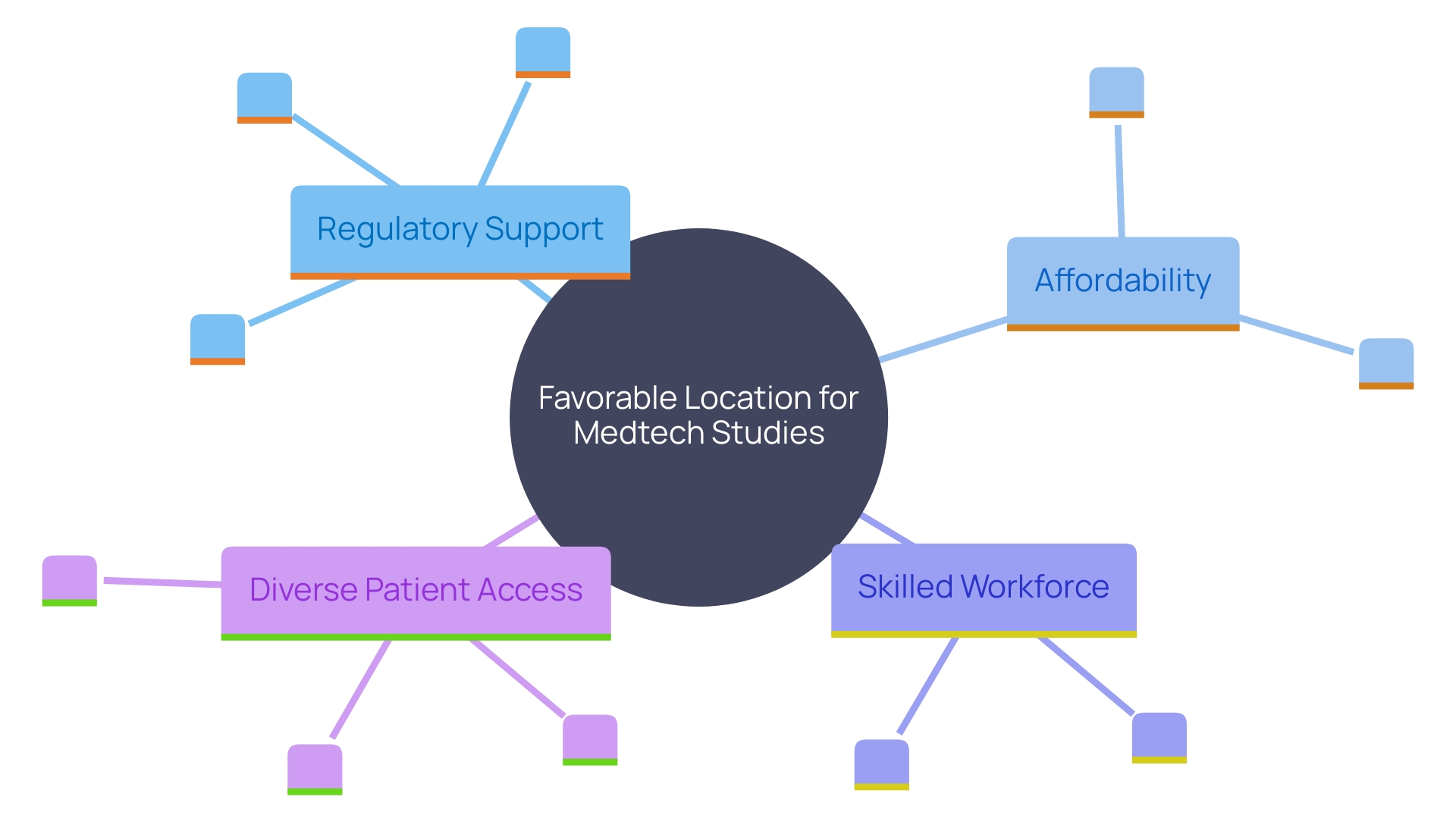
Paraguay's Clinical Research Landscape
The healthcare investigation setting in Paraguay is experiencing notable change, with an increase in Contract Research Organizations (CROs) focused on medical devices. These Cars are equipped with the necessary infrastructure and expertise, enabling efficient study management and ensuring adherence to global standards. The teamwork among governmental and private entities additionally improves the investigative environment, nurturing essential collaborations for effective medical experiments. In particular, the involvement of local entities ensures that studies are well-suited to the specific needs and conditions of the population, thereby improving the overall quality and relevance of the research. This progress corresponds with worldwide patterns, which suggest an increasing focus on engaging low- and middle-income nations in research studies to guarantee varied and representative information. Based on recent data, there are 2669 research studies for AI/ML-enabled medical devices worldwide, with notable participation from smaller nations in Asia and Europe. Such international collaborations are essential for developing robust medical solutions that cater to varied demographics. 'The increased participation of this nation in this global network not only boosts local healthcare capabilities but also contributes to the broader scientific community.'.
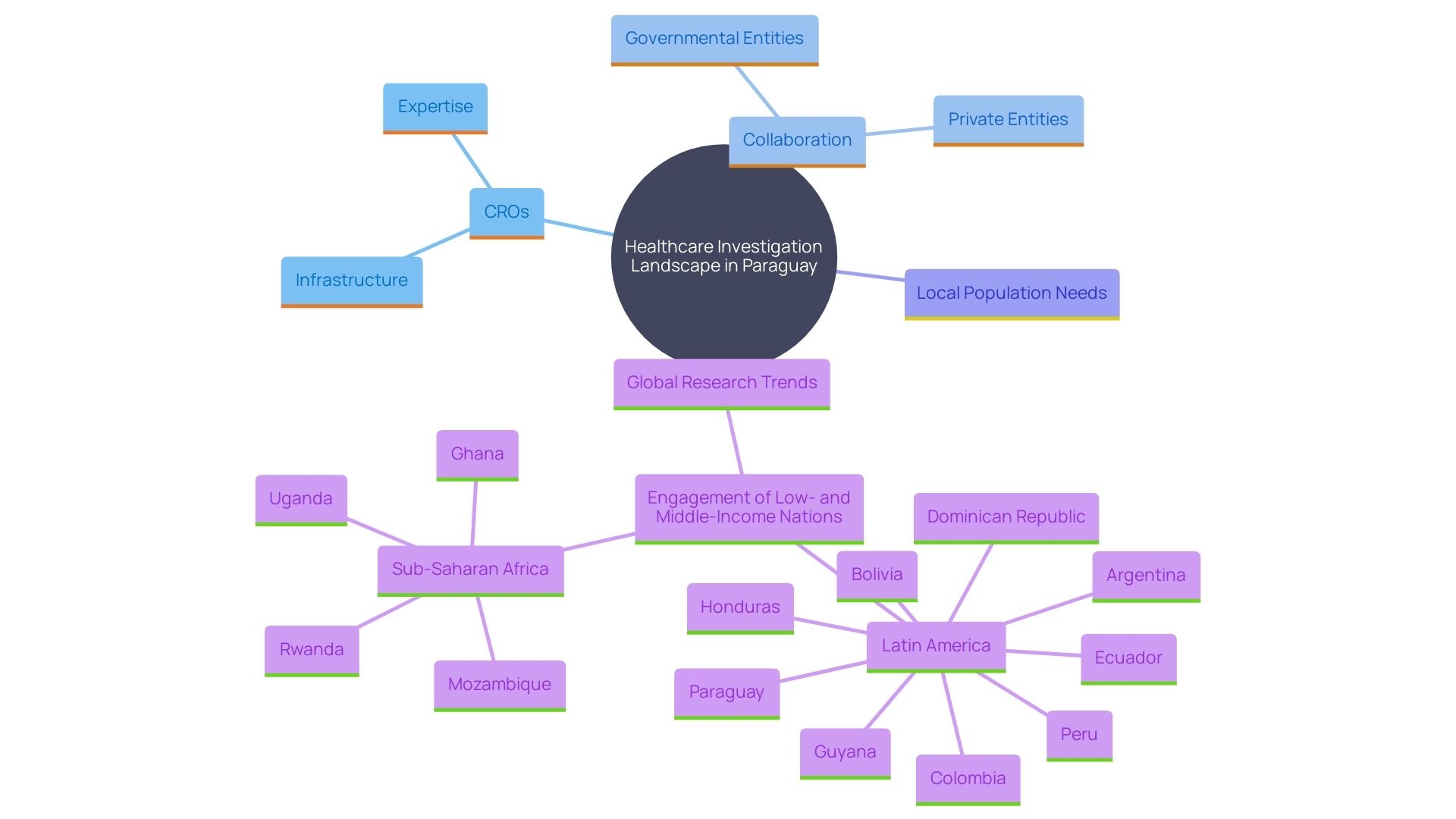
Regulatory Framework and Challenges
Paraguay's regulatory framework for medtech clinical studies is governed by the National Health Surveillance Directorate (DNVS). While the regulations are generally conducive to investigation, challenges such as lengthy approval processes and varying interpretations of guidelines can arise. This is particularly relevant as the number of AI/ML-enabled medical devices in development has surged, necessitating efficient regulatory pathways. Sponsors and CROs must effectively navigate these regulations to ensure compliance and minimize delays in study initiation. As Carine Cochereau from Integra Life Sciences pointed out, carrying out studies in less developed areas can provide benefits like increased recruitment rates and more involved research personnel, but also poses difficulties including the requirement for thorough training on study practices and guidelines. Consequently, comprehending and adjusting to the regulatory environment of the country is essential for the success of medical device studies.
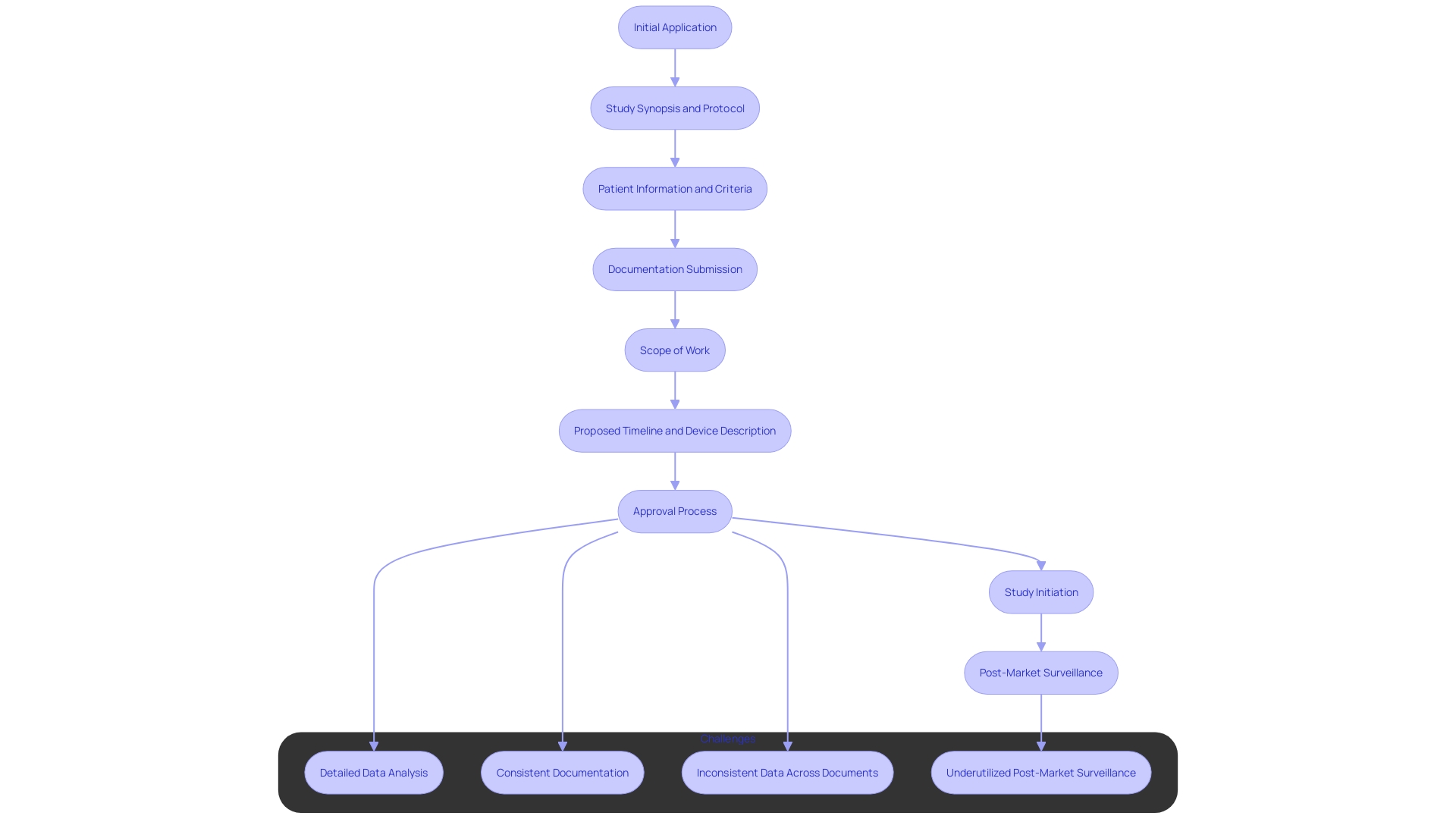
Success Stories of Medtech Clinical Trials in Paraguay
This nation has developed into a promising site for medtech clinical assessments, showcasing its potential through numerous successful case studies. These evaluations have effectively assessed innovative medical devices, leading to significant improvements in patient care. The success stories from Paraguay not only highlight the capabilities of local Contract Research Organizations (CROs) but also build confidence among international sponsors. A significant instance is the high involvement of study personnel and the availability of a varied patient group, which improves the dependability of findings. This aligns with Carine Cochereau's observation that smaller countries can offer advantages such as higher recruitment rates and a more engaged research staff. Furthermore, the strategic focus on early integration of Regulatory/Quality (RA/QA) processes has been crucial in ensuring compliance and smooth execution of studies. As the worldwide environment of medical studies changes, its proactive strategy positions the country as a competitive location for upcoming medtech research.
Key Factors for Successful Clinical Trials in Paraguay
To ensure the success of clinical trials in Paraguay, several critical factors must be addressed. First, selecting experienced local investigators is paramount. This approach not only leverages indigenous expertise but also fosters trust within the patient population. For instance, the journey of Flavia Rocha, a maternity nurse from Buenos Aires, who transitioned into leadership in investigations after attending a symposium, exemplifies the impact of local involvement in scientific inquiry. Her narrative emphasizes the significance of enabling local experts to guide and motivate investigative initiatives.
Building robust relationships with regulatory bodies is another essential aspect. Regulatory engagement, as highlighted by Carine Cochereau at the Outsourcing in Clinical Trials: Medical Devices Europe 2024 conference, can simplify research processes and ensure adherence to local guidelines. Cochereau observed that smaller nations, despite not having established trial centers, can provide substantial benefits such as higher recruitment rates and more dedicated personnel, given that there is sufficient training and support.
Understanding cultural nuances is equally important. Customizing protocols to reflect local traditions and patient requirements can improve participation rates and data precision. This cultural competence is crucial in addressing external validity concerns, ensuring the findings are applicable and beneficial to the local population.
Moreover, employing robust project management strategies is vital. Effective planning, execution, and publication of studies, as seen in the evaluation of leadership roles globally, are key to achieving successful outcomes. Researchers from developing countries often rely on support from government agencies and academic institutions to advance to leadership positions, underscoring the need for strong institutional backing.
Ultimately, sustaining transparent dialogue with all participants, encompassing healthcare experts, regulatory bodies, and patient groups, can significantly improve study results. This joint strategy guarantees that studies are carried out ethically and openly, promoting a supportive atmosphere for medical investigations.
By addressing these factors—local expertise, regulatory relationships, cultural understanding, project management, and stakeholder communication—clinical studies in that country can achieve greater success and contribute valuable insights to the global medical knowledge community.
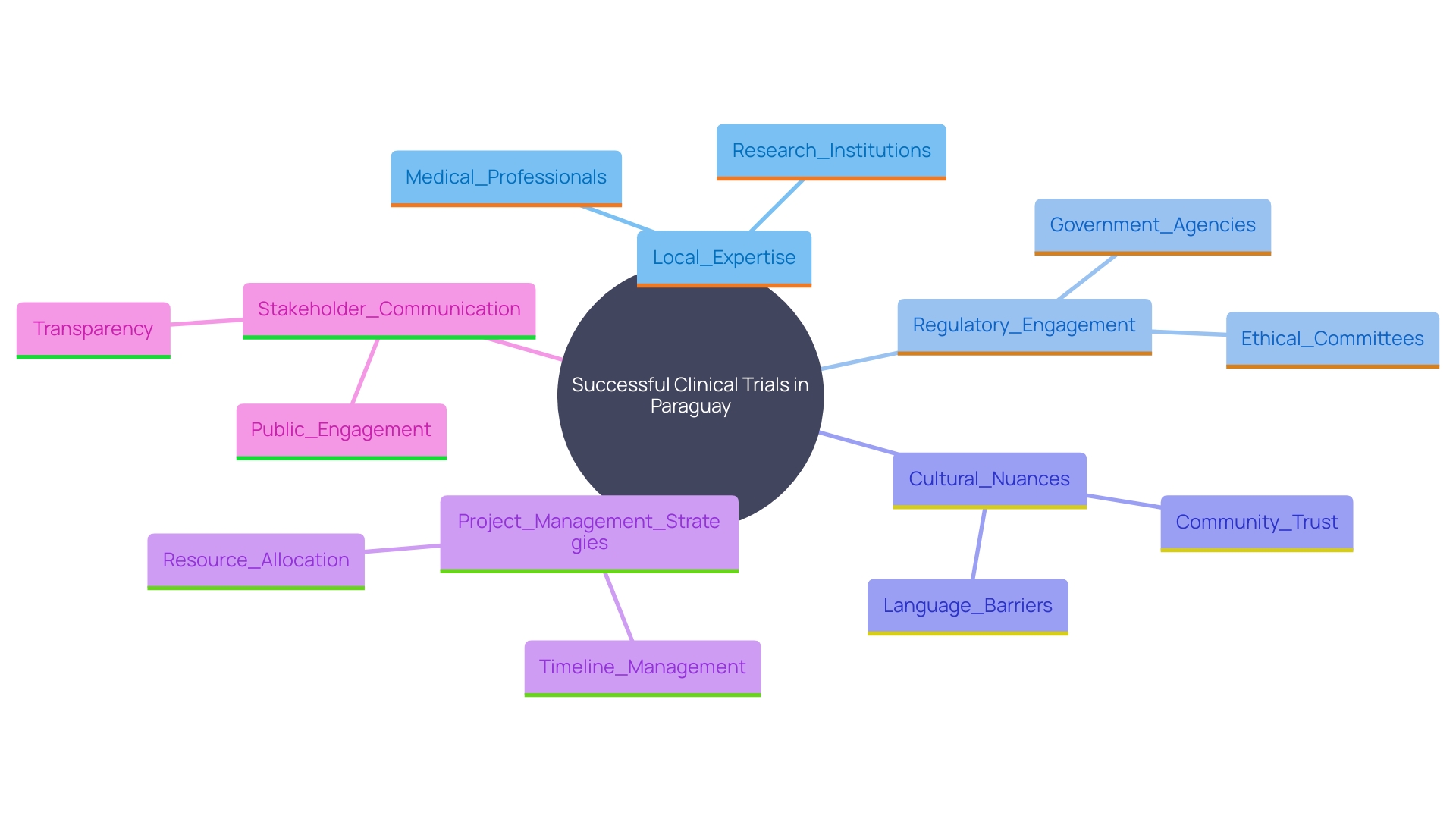
Future Opportunities and Growth in Paraguay's Clinical Research
The outlook for medical research in the country seems very encouraging, propelled by substantial funding in healthcare facilities and an increasing focus on innovation and advancement. This optimistic outlook is bolstered by international interest, as more companies recognize the strategic advantages of conducting clinical trials in the region. The medical technology market, including devices for diagnosis, treatment, and prevention, is expanding rapidly. For instance, the United States medical technology market is experiencing rapid growth due to increased R&D investments, a trend that is likely to influence and inspire similar expansions in another country.
Moreover, the evolving healthcare landscape of the country aligns with global trends where quality health systems are essential for better outcomes. Such advancements are crucial, particularly in low- and middle-income countries, where approximately 8 million people die from treatable conditions annually due to poor-quality healthcare.
The expanding market for medical technology clinical studies in Paraguay offers vast opportunities for Contract Research Organizations (CROs) and study professionals. Improved cooperation and funding in investigative capacity, akin to efforts observed in other areas, can greatly aid in the progress of medical technology. For example, initiatives like Global Research Nurses, which focus on supporting research in low- and middle-income countries, highlight the potential for local growth and expertise development.
Furthermore, the introduction of innovative solutions, such as CalmWave's AI technology to reduce alarm fatigue in hospitals, exemplifies the types of advancements that could be pivotal for the healthcare system in that country. As these technologies and practices become more prevalent, the potential for enhanced healthcare delivery and patient outcomes in the country is substantial. This environment of growth and innovation positions Paraguay as a key player in the future of medtech clinical research, offering ample opportunities for professionals to contribute to significant advancements in medical technology.
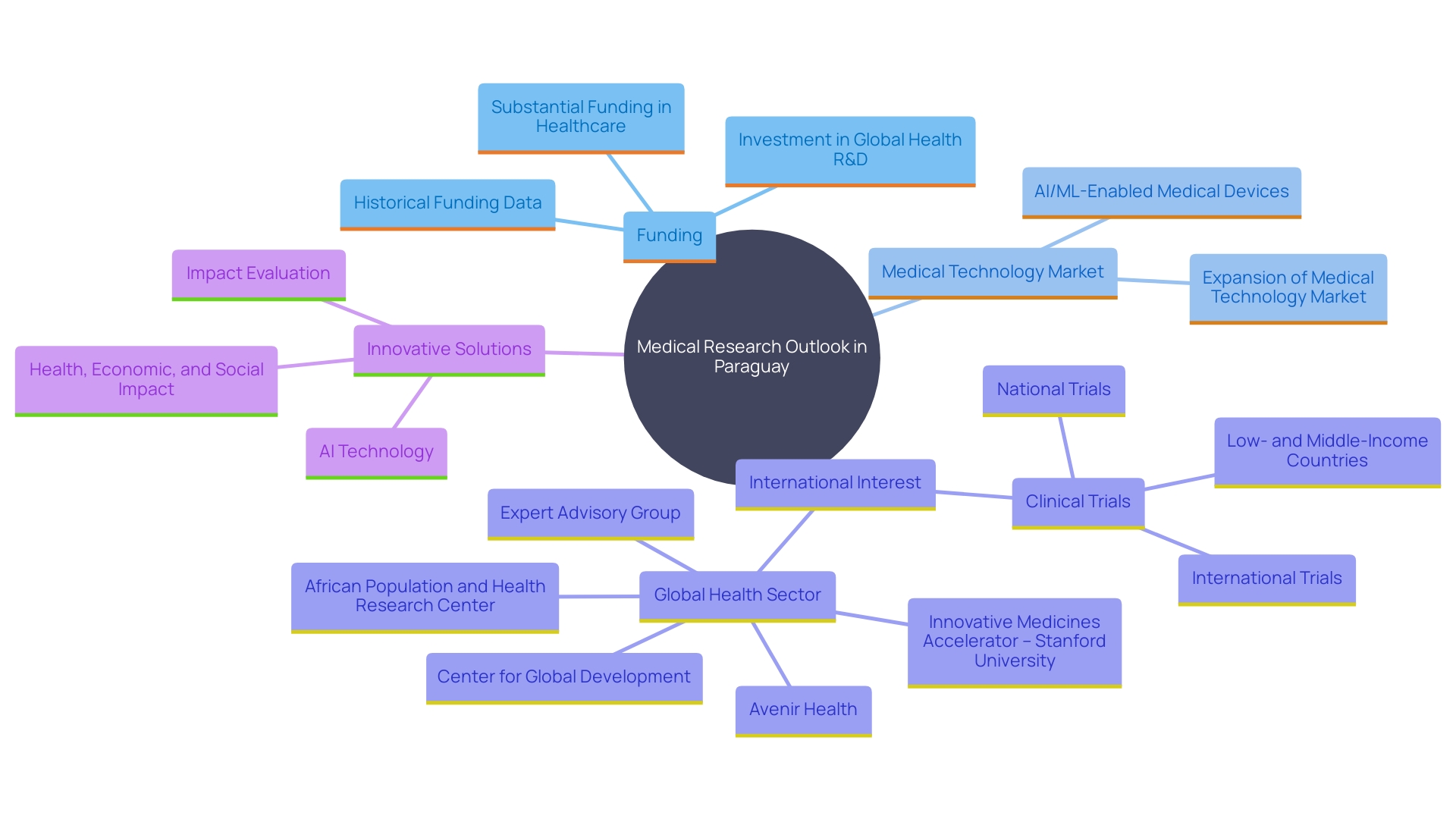
Conclusion
Paraguay's emergence as a favorable destination for medtech clinical trials is underscored by several key factors. The country benefits from a supportive regulatory environment that facilitates the efficient setup and execution of trials, coupled with cost-effectiveness that does not compromise research quality. Access to diverse patient populations enhances the relevance and inclusivity of clinical research, addressing disparities commonly seen in larger trial hubs.
The commitment to improving healthcare infrastructure further strengthens Paraguay's position as a competitive site for medical innovation.
The clinical research landscape in Paraguay is evolving, with a growing number of Contract Research Organizations (CROs) equipped to manage trials effectively. Collaborative efforts between public and private sectors have fostered partnerships that enhance the quality and relevance of research. Successful case studies from Paraguay highlight the capabilities of local CROs and the advantages of engaging local professionals, which lead to higher recruitment rates and better trial outcomes.
Such successes not only build confidence among international sponsors but also contribute to the broader scientific community.
Looking ahead, the future of clinical research in Paraguay appears bright, driven by increased investments in healthcare infrastructure and a focus on research and development. The expanding medical technology market offers extensive opportunities for CROs and research professionals, aligning with global trends that emphasize the importance of quality health systems. As Paraguay continues to embrace innovation and collaboration, it is poised to play a significant role in the advancement of medtech clinical trials, ultimately enhancing healthcare delivery and patient outcomes.




